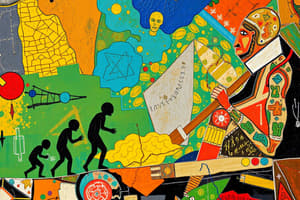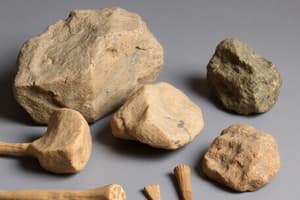Podcast
Questions and Answers
What characterizes a Personal Service Robot?
What characterizes a Personal Service Robot?
- Functions independently without human input
- Used for noncommercial tasks (correct)
- Operated by an operator for commercial tasks
- Performs tasks for humans or equipment
What technology was primarily associated with the Paleolithic Age?
What technology was primarily associated with the Paleolithic Age?
- Arrowheads
- Polished axes
- Plough
- Hand axe (correct)
What percentage of urban homes own at least one television according to Kantar Media?
What percentage of urban homes own at least one television according to Kantar Media?
- 92% (correct)
- 70%
- 75%
- 85%
Which phase is NOT part of problem-solving with technology?
Which phase is NOT part of problem-solving with technology?
Which of the following is NOT one of Asimov's three laws of robotics?
Which of the following is NOT one of Asimov's three laws of robotics?
What is the primary function of the Professional Service Robot?
What is the primary function of the Professional Service Robot?
How does society influence technological development?
How does society influence technological development?
As of the data provided, how many Filipino households own a television set?
As of the data provided, how many Filipino households own a television set?
What was a common tool during the Neolithic Age?
What was a common tool during the Neolithic Age?
What material were early tools primarily made from in both the Paleolithic and Neolithic Ages?
What material were early tools primarily made from in both the Paleolithic and Neolithic Ages?
Which of these is considered a systematic methodology for gathering accurate information?
Which of these is considered a systematic methodology for gathering accurate information?
What is the significance of the statement 'Necessity is the mother of invention'?
What is the significance of the statement 'Necessity is the mother of invention'?
In problem-solving with technology, which step comes immediately after evaluating the solution?
In problem-solving with technology, which step comes immediately after evaluating the solution?
Which National Scientist is known for contributions in Marine Biology?
Which National Scientist is known for contributions in Marine Biology?
What is the invention credited to Roberto del Rosario?
What is the invention credited to Roberto del Rosario?
Which product was developed as an antibiotic from the Aspergillus species of fungi?
Which product was developed as an antibiotic from the Aspergillus species of fungi?
What is one of the focuses of the Department of Science and Technology (DOST)?
What is one of the focuses of the Department of Science and Technology (DOST)?
Who co-invented the Moon Buggy used for lunar exploration?
Who co-invented the Moon Buggy used for lunar exploration?
Which of the following was NOT mentioned as a contribution of Science and Technology to society?
Which of the following was NOT mentioned as a contribution of Science and Technology to society?
In what year was the Diwata-1 satellite launched?
In what year was the Diwata-1 satellite launched?
Which invention is Gregorio Y. Zara known for?
Which invention is Gregorio Y. Zara known for?
Which ethical dilemma is primarily associated with robotics?
Which ethical dilemma is primarily associated with robotics?
What was the first mobile phone ever introduced?
What was the first mobile phone ever introduced?
According to Aristotle and Plato, what is crucial in understanding the good life?
According to Aristotle and Plato, what is crucial in understanding the good life?
What impact did the ownership of mobile devices have from 2010 to 2022?
What impact did the ownership of mobile devices have from 2010 to 2022?
What role does advertising play in the context of technology and society?
What role does advertising play in the context of technology and society?
What is considered the ultimate goal of human existence according to Aristotle?
What is considered the ultimate goal of human existence according to Aristotle?
What do the atomists believe about the composition of the world?
What do the atomists believe about the composition of the world?
According to hedonism, what is the primary focus of life?
According to hedonism, what is the primary focus of life?
In the context of human flourishing, which of the following statements aligns with materialistic views?
In the context of human flourishing, which of the following statements aligns with materialistic views?
What distinguishes Stoicism's approach to happiness?
What distinguishes Stoicism's approach to happiness?
How does Aristotle define the concept of 'telos' in relation to actions?
How does Aristotle define the concept of 'telos' in relation to actions?
What is a key principle behind humanism as described in the content?
What is a key principle behind humanism as described in the content?
What does happiness represent in the context of human flourishing?
What does happiness represent in the context of human flourishing?
Flashcards are hidden until you start studying
Study Notes
Stages of Prehistoric Tool Development
- Paleolithic (Old Stone Age): Stone tools like hand axes, scrapers, choppers, grinders, arrowheads, and flakes were used. This stage also involves bone and wood tools.
- Neolithic (New Stone Age): Polished axes, blades, arrowheads, ring stone, sickles, mullers, and ploughs were developed. This stage saw advancements in tool technology and the development of agriculture.
The Nature of Technology
- Technology is a human-made world of tools and techniques used to solve problems.
- Science explains the natural world using a systematic methodology to gather accurate information.
Phases of Problem Solving with Technology
- Identifying a problem: Observing and understanding the technological challenge.
- Developing a solution: Creating a plan to solve the problem.
- Evaluating the solution: Assessing the effectiveness of the implemented plan.
- Communicating the solution: Sharing the solution with others to spread knowledge.
Technological Development: Who is Responsible?
- Society drives technological development by identifying needs. The common phrase “Necessity is the mother of invention” highlights this.
Philippine Innovations and Contributions to Science & Technology
- Agriculture and Fisheries Mechanization (AFMech) Law (RA 10601): This law promotes mechanization in agriculture and fisheries.
- National Scientists:
- Gavino C. Trono (Marine Biology): Known for his work in seaweed research.
- Angel C. Alcala (Biological Science): Recognized for conservation efforts and studies on coral reefs.
- Ramon C. Barba (Horticulture): Made significant contributions to tissue culture and mango production.
- Edgardo D. Gomez (Marine Biology): A leading expert on coral reefs and marine environmental issues.
- Innovations:
- Bamboo Incubator and Jaundice Relieving Device: Developed by researchers as a result of the studies undertaken under the AFMech law.
- Karaoke Machine: Patented by Roberto del Rosario in 1975, this popular entertainment device became a cultural phenomenon.
- Luna Rover: Co-invented by Eduardo San Juan, this lunar vehicle allowed astronauts to explore the moon.
- Video Phone: Invented by Gregorio Y. Zara, this forerunner to current video chat technology involved a photophone separator signal. He holds 30 total patents.
- Erythromycin: Developed by Abelardo Aguilar, an antibiotic derived from the Aspergillus species of fungi.
- ALCO-Diesel, Lan-gas, and SUPERBUNKER FORMULA: Invented by Rudy Lantano Sr., a revolutionary fuel mixture composed primarily of water that burns faster and emits fewer pollutants.
Social Impact of Technology: Television, Mobile Phones, and Computers
- Television: Plays a significant role in the lives of many Filipinos, serving as a primary source of entertainment and advertising.
- Mobile Phones: Have become ubiquitous in the Philippines, evolving into all-in-one devices for communication, entertainment, and more.
- Computers: Have become essential tools for communication, advertisement, and entertainment.
The Role of Robots
- Personal Service Robots: Designed mainly for non-commercial tasks, assisting humans in domestic settings.
- Professional Service Robots: Used in commercial settings, often under human control.
Isaac Asimov's Three Laws of Robotics
- Law 1: A robot cannot injure a human or, through inaction, allow a human to come to harm.
- Law 2: A robot must obey orders given by human beings except where such orders would conflict with the First Law.
- Law 3: A robot must protect its own existence as long as such protection does not conflict with the First or Second Law.
Ethical Dilemmas in Robotics
- Safety: Ensuring robots operate safely without causing harm.
- Emotional Component: Addressing the potential for robots to develop emotional responses.
- Deviation from the Laws: Addressing instances where robots might disobey Asimov's Laws.
- Thinking Robots: Examining the ethical implications of robots developing the ability to think independently.
Defining the Good Life: Aristotle and Philosophies of Happiness
- Aristotle: Emphasized the human pursuit of happiness (eudaimonia) as the ultimate goal. He believed happiness is achieved through fulfillment of one's potential in life.
- Plato: Distinguished between two worlds: The world of forms (perfect, unchanging) and the world of matter (imperfect, constantly changing). He argued that true reality resides in the world of forms.
- Theism: Based on the idea that the ultimate source of happiness lies in communion with God.
- Humanism: Emphasizes the freedom of humans to chart their own destiny, free from religious control.
- Materialism: Focuses on matter as the fundamental reality, believing that happiness is achieved through material possessions and experiences.
- Hedonism: Places emphasis on pleasure as the primary goal of life, advocating for indulging in sensory experiences.
- Stoicism: Promotes happiness through detachment from external factors and emotional indifference.
Studying That Suits You
Use AI to generate personalized quizzes and flashcards to suit your learning preferences.




